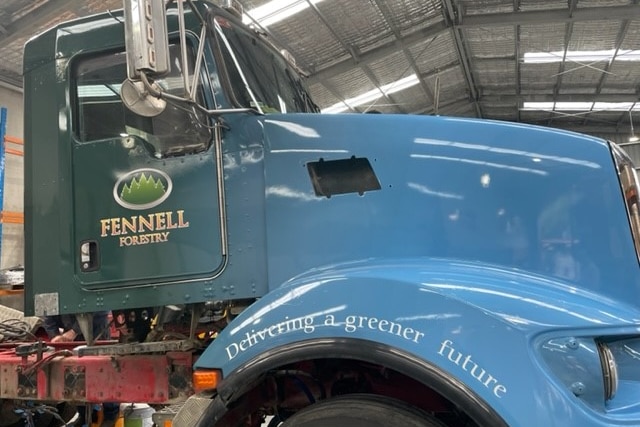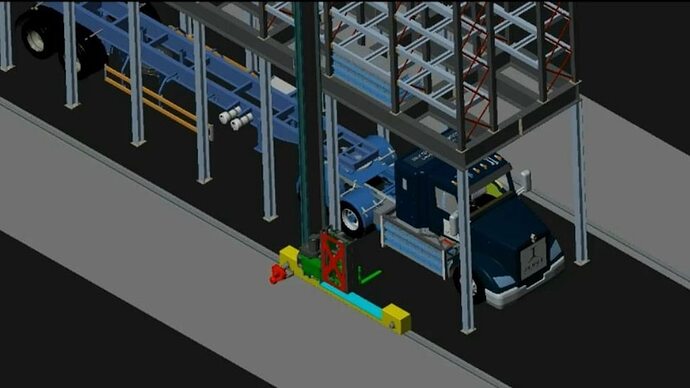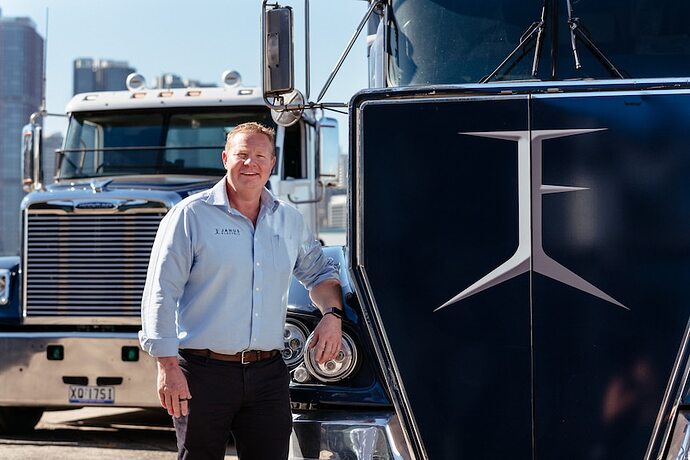First electric logging truck to be trialled in SA’s Green Triangle forestry region
/ By Leon Georgiou and Becc Chave
Space to play or pause, M to mute, left and right arrows to seek, up and down arrows for volume.
WATCH
Duration: 1 minute 7 seconds1m 7s
Janus Electric’s robotic charge station removes the need for electric trucks to stop and charge(Supplied: Janus Electric)
Help keep family & friends informed by sharing this article
abc.net.au/news/electric-truck-trial-forestry-company-green-triangle-sa-freight/101405872
One of Australia’s largest forestry regions hopes to transform the freight industry with a local harvester trialling an electric truck.
Key points:
- A forestry harvester in South Australia’s Green Triangle will take possession of the region’s first electric logging truck
- NSW startup Janus Electric is able to convert existing diesel trucks into electric powered vehicles
- Its electric trucks exchange batteries like a race car replaces tyres, removing the need to park and charge
Fennell Forestry is set to take possession of the Green Triangle’s first electrified logging B-double this month with a purpose-built charging station under construction in its yard.
NSW start-up Janus Electric developed the technology allowing businesses to convert their existing diesel engine trucks into electric powered vehicles, with zero emissions.
General manager Lex Forsyth said the team had developed a modular conversion system allowing it to transform most prime movers, trucks, and OEM products.
“There are currently about 105,000 registered Class 8 trucks in Australia,” he said.
“Our solution is well suited to around 80 per cent of the market here in Australia.”
Mr Forsyth said the significant capital investment needed to purchase a new truck versus converting an existing vehicle was a key factor in Janus’ modular design.

Fennell Forestry is the first logging company in the Green Triangle to trial the use of electric trucks in its fleet.(Supplied)
“We’ve gone down a conversion model because the reality is we only produce 5,000 new trucks a year for our market,” he said.
"If we were going to try and change the way we consume energy and go to a greener transport and logistics task, it would take us 20 years if we started producing brand new trucks today.
"The big thing for fleet operators is that after five years, trucks are due for an engine rebuild anyway.
“So rather than rebuilding the diesel engine, [they can put] in a new electric motor and get away from the diesel costs and the maintenance of operating a diesel vehicle.”
Swapping batteries
Unlike electric vehicles which plug into a charging station, Janus’ electric system replaces a truck’s batteries like a race car replaces its tyres during a pitstop.
“We’ve created an exchangeable battery technology to alleviate the problem of vehicles being parked to charge and fleet operators losing utilisation,” Mr Forsyth said.
"There are two batteries on the truck … that go into where the fuel tanks were on the vehicle and they swap out.
“We’re currently doing it with a 3-tonne forklift, and it takes about four minutes to swap both batteries.”
But in the future, Mr Forsyth envisages a more automated approach.
“As we get to a larger scale, trucks will go through a robotic charging change station where the truck will just simply drive in underneath the charge station and the batteries are stacked above it,” he said.
Lex Forsyth is CEO of the NSW startup Janus Electric, converting existing diesel trucks into zero emission electric vehicles.(Supplied)
“It’s no different to having a 2-tonne pallet being put onto a truck, it will just be done robotically.”
Janus’ battery stacking station can also double as an energy storage system, charging batteries during periods when the energy grid is producing a surplus of energy.
“The beauty of our exchangeable technology is that we’re not reliant on the grid to take that energy back because it’s always going into the logging trucks,” Mr Forsyth said.
“It offers a great saving to the fleet operators [by] reducing their fuel and maintenance costs but the environment is the key benefit from this.”
Significant transition
South Australian Forest Products Association CEO Nathan Paine said the industry’s transition to electric vehicles would take time but was inevitable.
“There is absolutely a push globally to decarbonise … and I think it will mean that we will see technologies such as electric trucks, and indeed maybe hydrogen trucks, coming into the fleet,” he said.
"We’re a very green industry but that doesn’t mean that we can’t do better which is why, across the industry, we’re looking at ways that we can decarbonise our operations.
“I’m pretty convinced that in the next five to 10 years, electric trucks will become a far more significant part of managing the freight effort in this country.”

